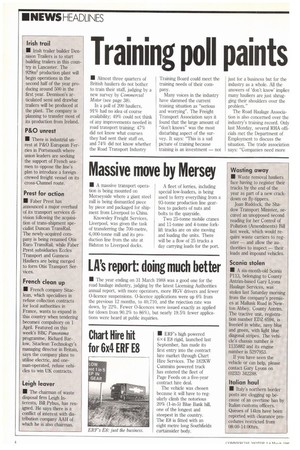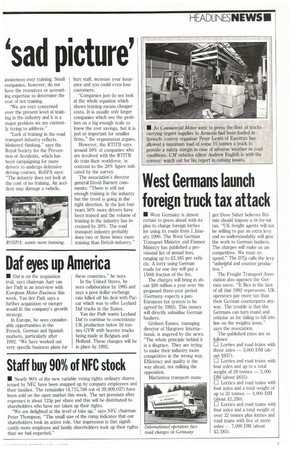Training poll paints 'sad picture'
Page 6

Page 7

If you've noticed an error in this article please click here to report it so we can fix it.
• Almost three quarters of British hauliers do not bother to train their staff, judging by a new survey by Commercial Motor (see page 38).
In a poll of 200 hauliers, 91% had no idea of course availability; 49% could not think of any improvements needed in road transport training; 47% did not know what courses they had sent their staff on, and 74% did not know whether the Road Transport Industry Training Board could meet the training needs of their company.
Many voices in the industry have slammed the current training situation as "serious and worrying". The Freight Transport Association says it found that the large amount of "don't knows" was the most disturbing aspect of the survey. It says: "This is a sad picture of training because training is an investment — not just for a business but for the industry as a whole. All the answers of 'don't know' implies many hauliers are just shrugging their shoulders over the problem."
The Road Haulage Association is also concerned over the industry's training record. Only last Monday, several RHA officials met the Department of Employment to discuss the situation. The trade association says: "Companies need more awareness over training. Small companies, however, do not have the resources or accounting expertise to determine the cost of not training.
"We are very concerned over the present level of training in the industry and it is a major problem we are currently trying to address."
"Lack of training in the road transport industry reflects blinkered thinking," says the Royal Society for the Prevention of Accidents, which has been campaigning for more drivers to undergo defensive driving courses. RoSPA says: "The industry does not look at the cost of no training. An accident may damage a vehicle, hurt staff, increase your insurance and you could even lose customers.
"Companies just do not look at the whole equation which shows training means cheaper costs. It is usually only larger companies which see the problem on a big enough scale to know the cost savings, but it is just as important for smaller firms," the organisation argues.
However, the RTITB says around 50% of companies who are involved with the RTITB do train their workforce, in contrast to the 28% figure indicated by the survey.
The association's director general David Barnett comments: -There is still not enough training in the industry but the trend is going in the right direction. In the last four years 50% more drivers have been trained and the volume of training in the industry has increased by 20%. The road transport industry probably does two or three times more training than British industry."




















































































































































